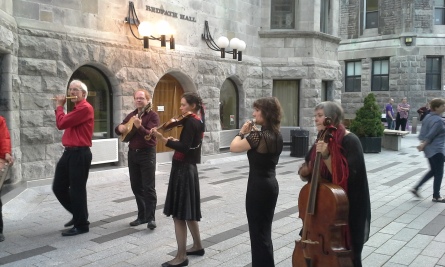I recently attended about a dozen concerts and lectures at the Montreal Baroque Festival. I have been thinking a lot about how this festival was different from the Boston Early Music Festival (BEMF), which I attended earlier this month and discussed in a previous blog post.
Ensemble Caprice plays outside following its concert at the Montreal Baroque Festival, June 25, 2015. Photo taken by Jacob Sagrans. Musicians, from left to right, are: Matthias Maute, David Jacques, Lucie Ringuette, Sophie Larivière, and Susie Napper.
Montreal’s festival is significantly smaller than BEMF. It runs for just four days and the most well attended concert (the final one) filled McGill’s 600-seat Pollack Hall to about 75% capacity. At many of the other concerts, most seats were empty, perhaps because the Festival ran concurrently with both the Montreal Jazz Festival and the Festival de musique de Lachine. In Boston, many concerts were sold out and were given at venues that could hold up to a thousand people (such as Jordan Hall). The low attendance in Montreal was unfortunate, but on the plus side it did mean that the concerts felt quite intimate.
I liked that the Montreal festival was more laid back, friendly, and inclusive in feeling than BEMF. Before and after concerts it was common for audience members and performers alike to hang around outside (when weather permitted), chatting about the music on the program and enjoying free snacks provided by Festival staff and volunteers (more on the snacks below).
In Montreal, individual ticket prices ranged form $20 for students/seniors to $40 for regular admission. The cheapest concert I went to in Boston cost $55 (US, or about $68 Canadian), and there were no discounts. People who are less willing or able to spend fair sums of money on early music were probably better represented in the Montreal audiences and the Festival, while less well attended than BEMF, likely reached a broader range of the local population.
Montreal, like Boston, featured some very high caliber performers and presenters (although not as many as BEMF). They included pioneering Belgian Baroque violinist and violoncello da spalla player Sigiswald Kuijken, internationally renowned Acadian soprano Suzie LeBlanc, French musicologist Gilles Cantagrel (who gave brief lectures on Bach’s cello suites), and rockstar Québécois Baroque violinist Olivier Brault.
The theme of the 2015 Festival was also a nice touch. This year it was “ether and earth” or “éther et terre” (note the clever French play-on-words). Concerts had names like “Bach au ciel” (heavenly Bach) and “De la terre à l’Espace (from earth to space), and we even got to eat earth and the ether surrounding it at a reception following the final concert (aka, blueberries dipped in white chocolate).
One final thing I enjoyed about the Montreal Baroque Festival is that performers often crossed boundaries between different musical genres and between music and other art forms. The Festival started with Ensemble Caprice playing an invigorating mixture of Vivaldi and gypsy music (a concert based on this album). Ensemble Alkemia sang early a cappella choral works accompanied by modern dance, Infusion Baroque played instrumental chamber works by Telemann while artist Sylvia Chan created a painting inspired by the music, and Fuoco e Cenere performed music from the reign of Louis XIV in what might best be described as a seventeenth-century cooking show in the form of a comic opera (imagine vigorous chopping of vegetables in time to Lully’s famous “Marche pour la cérémonie des Turcs”). These concerts allowed the audience to experience early music in new, visually beautiful, and tasty ways (we got to eat the food Fuoco e Cenere made after the performance).
Video excerpts from Fuoco e Cenere’s gastronomic concert
The organization of the Festival could have been a bit stronger though. The program booklet read as if no one had proofread it—among many other typos, it was often incorrect in its listing of the times and places of concerts. Thankfully the tickets themselves listed the correct places and times; nonetheless such major errors in an official Festival document are inexcusable. The booklet also did not include texts or translations of the vocal works performed, nor did it include biographies of any of the soloists apart from Kuijken (I believe programs ought to include both to do justice to the music as well as the performers). And audience members were required to purchase program booklets—those who did not were not even given a simple list of the works in a concert, so many probably had little idea of what they were hearing.
All concerts were general admission, which meant that those hoping to get good seats had to spend a lot of time waiting in line (but on the other hand, it meant good seats were no more expensive than bad ones). The Festival’s advertising seemed to be quite minimal (I don’t recall seeing any posters for it at the McGill music faculty). Better advertising could have increased attendance (although perhaps at a cost that the Festival was not able to pay).
Overall, though, I had an excellent time this year at the Montreal Baroque Festival. I am excited to attend again next year.
If you would like more details about the events that occurred at the Festival, I suggest reading the following articles:
- “Classical festivals compete with you-know-what” (Arthur Kaptainis, Montreal Gazette, June 24, 2015) (N.B.: “you-know-what” presumably refers to Jazz Festival)
